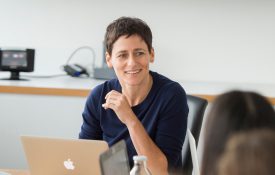-

Biology Beats Calories in Matters of Weight
Calorie intake and energy expenditure do not explain body weight to the extent that scientists once thought.
-

Update on AMPPS: APS’s Newest Journal to Feature a Range of Empirical Articles and Topical Issues in Research Methods
The new APS journal devoted to research methods and practices is receiving a steady flow of submissions and has already accepted a number of papers for publication.
-
International Seminar on the Teaching of Psychological Science
The inaugural Biennial International Seminar on the Teaching of Psychological Science (BISTOPS) will take place on July 9 through 13, 2018 in Paris at Maison Suger, the Fondation Maison des Sciences de l'Homme's residential and working facility. The English language seminar is designed to give around 20 participants the opportunity to discuss existing research on the scholarship of teaching and learning in psychology, to exchange new research ideas, to create collaborative international research teams, and ultimately to generate published empirical studies whose results will promote evidence-based recommendations for improving the teaching of psychological science on an international scale.
-

Sleep and Social Stress: A Two-Way Street
Which social skills go out the window when folks become groggy? What stressors make for lousy sleep?
-

Paluck Named 2017 MacArthur Fellow
Psychological scientist Betsy Levy Paluck is recognized for her innovative research investigating behavior change in social groups.
-
Psychological Science Underlies Nobel Prize-Winning Work
The Nobel Prize in Economic Sciences awarded to economist Richard H. Thaler has its roots firmly planted in psychological science, particularly in the groundbreaking research of APS William James Fellows Daniel Kahneman and Amos Tversky. The Royal Swedish Academy of Sciences announced the award October 9, 2017 in Stockholm, citing Thaler’s pioneering work showing how human behavior consistently defies economic theory. His findings have inspired many governments and organizations to inject more behavioral research and economics into policymaking efforts.

